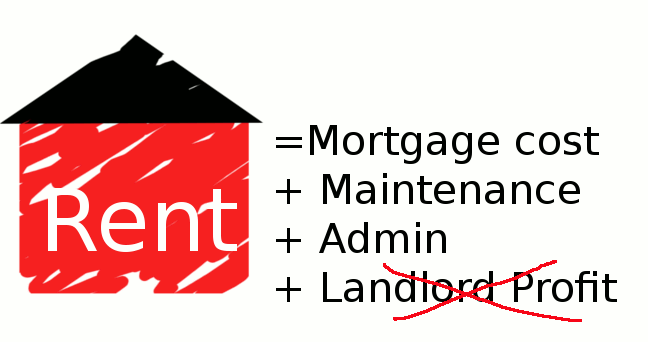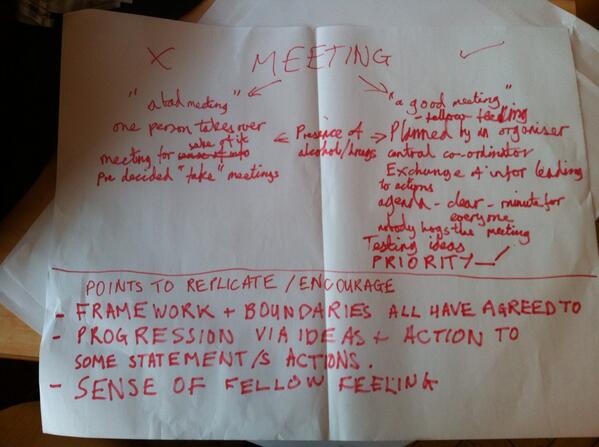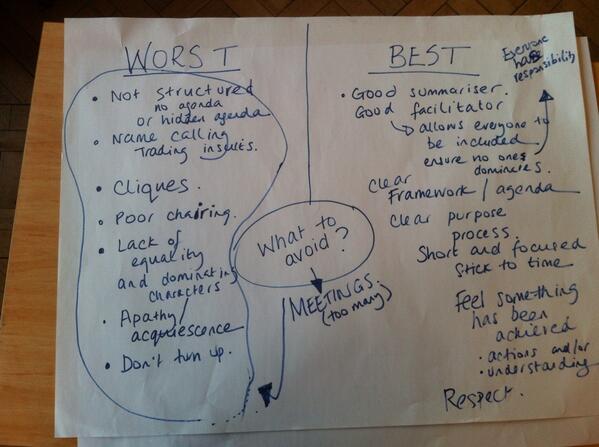Our friend Brian Van Slyke, designer of Co-opoly has written an interesting response to our article on co-operative culture, focusing on co-operative culture and start-ups. We like it so much it is posted in its entirety here:
Getting People to the Cooperative Breakfast Table: Forging A Co-op Culture During the Start-Up Phase
The recent series on Cooperantics.coop about creating a cooperative culture was absolutely fascinating and an important contribution to the co-op movement. One particular quote stuck out to me, from a member of the Calverts Co-op:
Co-operative culture eats co-operative governance for breakfast
This is a critical statement that rings extremely true in my experience. At the same time, many people’s lives and environments have shaped them in a way that has not prepared them for the co-op experience in the slightest. The idea of a co-op culture is the anti-thesis of how they are used to working. In fact, as much as they might need to learn about co-ops and co-op culture, there’s probably a hefty amount of unlearning that needs to be done as well.
Recently, I was at a co-op workshop in Chicago with a range of folks from different cooperative backgrounds – people who were learning about the subject for the first time, co-op developers, and a few who’d been in the field for a long time. One attendee was part of a large, newly forming catering co-op going through some of the start-up phase pangs. This co-op is in the midst of getting off the ground and many of their members work other jobs. Most of these members are people who’ve never been in a co-op before, who have mostly worked low-wage jobs with a boss that simply tells them what to do. This, the co-op rep told us, was causing problems. He, as the person with the original idea for the catering co-op, had been made into the de facto point man–and sometimes he even felt like a boss. This wasn’t what he wanted, but he wasn’t sure how to change things. People weren’t showing up for member meetings. People would be assigned tasks that they would never follow up on. He’d ask people what they should do about certain issues, and only get blank stares in response. They’d just ask him to take on all the responsibilities and be the face of the business. He told the rest of the workshop attendees that this wasn’t feeling much like a co-op, and he wanted to know what he could do to change things.
This all brings up an intriguing question. If co-op culture eats co-op governance for breakfast, how do we get people to the breakfast table in the first place? (If I dare stretch the analogy that far…) Some people have no history, no exposure, no understanding of what co-ops and co-op culture is in the first place. So how do we even get them to commit to the idea? Well, the co-op cater’s question sparked a long and lengthy dialogue in the workshop. It involved people ranging from those were starting their own co-ops to folks who had been in the co-op movement for quite a time. And below were some of the key take-aways from that conversation.
Making Sure You Have The Right People
One of the primary concerns this co-op rep had was: do I have the right people? Is it better to bring in people who are excited about the co-op mission, or who need the co-op the most?
There was a long and lengthy conversation over this point. But one thing that everyone agreed on was that you can’t start a co-op with people who don’t want to start it. The start-up stage is one of the most vulnerable times for any cooperatives. If you don’t have people who aren’t committed, who aren’t going to do everything in their power to make it work… then you really have to take a good, long look at whether your co-op dream has the chance of becoming a reality.
One thing that often happens during situations like this is a natural self-selection process–those who are not fully committed to the struggles of forming a co-op will fall off the bandwagon. At some point, however, you do have to decide on a key question: who is going to work with me, through thick and thin, to make this thing happen? And you need to commit to those individuals. Then, down the road, when you’re more financially and institutionally stable, you can be intentional about building room for those people who need more encouragement to join in on the cooperative culture and process.
Buy-In: Not Just Purchasing a Share
Another key point that was brought up during our discussion was that a buy-in isn’t just about purchasing a share in the co-op. It’s also about showing people that their opinions matter and will have a real, lasting impact in the workplace. That’s something most people are not used to, and simply don’t know how to react when they’re presented with the opportunity for first time.
One co-op developer shared his experience of working with a group where there was one member who never spoke – no matter what. One day, when the co-op was facing a serious issue, the developer went around the room and asked everyone specifically to share their thoughts about how the co-op should take on the situation. That person who never said a word? He gave the most in-depth and best idea of anyone, and the co-op eventually put his suggestion into practice. When the developer asked this silent member why he had never spoken up before, the member said it was because no one had ever asked him, directly, what he thought. He wasn’t used to being able to speak up and wasn’t comfortable with just jumping into a conversation.
Since then, this once silent member has become one of the co-op’s most vocal. The workshop attendees reflected that this was likely because not only was he asked for his thoughts, but he also saw them put into action. That was his buy-in to the cooperative culture.
Member Meetings: Should they be paid time?
Another thought that came up was something that’s been recently debated within the worker co-op movement: should member meetings be paid time?
Paying for members’ meeting times is certainly more difficult for start-up co-ops and those who don’t have much financial reserves. However, if people aren’t committing to attending meetings, then this is something that could be used to push them over the edge to join. In addition, most worker co-ops do consider member meetings to be labor. As such, that time should be paid for, if possible. For those who are unused to the idea of a co-op culture, and of being expected to participate in decision making and planning, this could be the needed catalyst to get them to the table.
Build Member Meetings into Existing Work Times
Related to the above was the issue of finding a time for everyone to get together. The co-op rep who was sharing his concerns stated that others were often making excuses about why they couldn’t attend meetings. Family issues, weekend mornings aren’t good for them, weekend afternoons aren’t good for them, weekend evenings aren’t good for them, after work hours aren’t good for them, transportation time and costs, and so on and so forth.
One suggestion that was offered was the idea of finding time during the busy workday to, no matter what, have the member meetings – while everyone is already there. Of course, this can be difficult for those who are already so jammed with work and crunched for time. However, it might be necessary if that’s the only opportunity where everyone can be together. In addition, this approach would help build the understanding that meetings are an expected part of the co-op’s work. They’re not separate or optional. They’re part of being in the business.
Making Communal Expectations, Sticking to Them
The final big suggestion was to make and agree to communal expectations, and to have everyone sign off on them. These expectations could even be posted on the co-op’s walls, so that everyone would be reminded of them on a regular basis. In this way, no one could say, “I didn’t agree to that!” Because they literally have. In addition, this approach builds a common understanding of what is expected from each other – instead of assuming people will work off of unspoken agreements. Finally, the co-op would have to ensure that people are sticking to their agreements and expectations. If people have agreed to attend all meetings, save for emergencies, illness, etc., but they regular miss them – there should be a process for grievance and review. If someone misses three or four meetings in a year without appropriate excuses, maybe they should be asked if the co-op model is for them. Whatever it is, creating clear expectations, having everyone agree to them, and having them upheld is critical to creating a vibrant cooperative culture.
Obviously, not all of these ideas will work for all groups (many of them are worker co-op specific) and there are many other ideas to share. The above is more of a synthesis of a brainstorm that happened in Chicago. Still, these are good ideas that should be evaluated for each start up co-op. Building a co-op culture is critical for building a successful, thriving, democratic organization. At the same time, we need to find ways to bring many people to the table to begin with.
Brian Van Slyke is the founder of The Toolbox for Education and Social Action, a worker cooperative that creates and distributes educational resources for social and economic change, such as Co-opoly: The Game of Cooperatives




